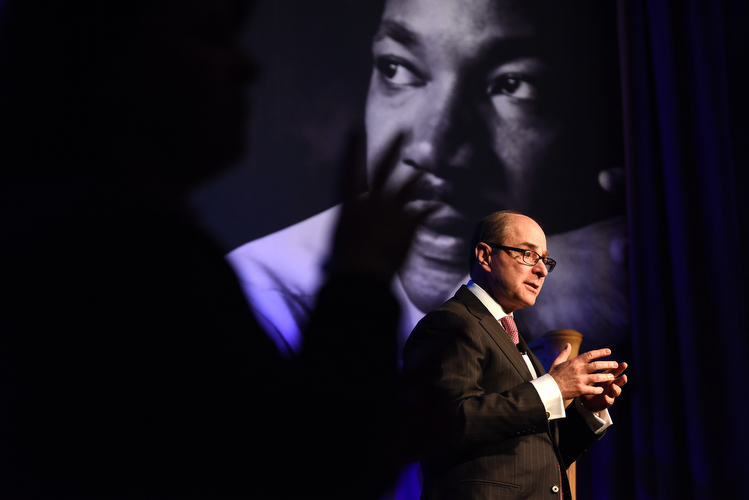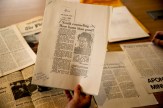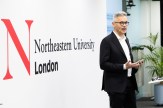Messages of empowerment, legacy at King convocation

“Ordinary people who decided to be extraordinary people.” That’s how Kimberly P. Johnson, PhD’16, described the “Friendship Nine,” a group of young men who in 1961 were jailed after staging a sit-in at a whites-only lunch counter in Rock Hill, South Carolina. They gained national attention for launching the “jail, no bail” strategy later adopted by other activists—in which they accepted the punishment of 30 days hard labor rather than pay their fines.
Johnson, a children’s book author and a doctoral candidate in Northeastern’s education program, wrote No Fear for Freedom: The Story of the Friendship 9. On Tuesday afternoon she was the keynote speaker at “A Tribute to the Dream,” the first in a series of weeklong events celebrating the life and legacy of Martin Luther King Jr., in the Curry Student Center Ballroom.
“You see, they were legacies,” Johnson said of the “Friendship Nine.” She then shared her thoughts on how to become legacies. To do so, she found inspiration from the word’s letters: “L,” live like it matters; “E,” empower other people; “G,” gain as much knowledge as you can; and “ACY,” always challenge yourself.
Powerful messages
Throughout the event, other members of the Northeastern community shared their thoughts on how King has influenced them and how his legacy lives on today. President Joseph E. Aoun recalled that from afar, while growing up abroad, he was inspired by King. “Dr. King’s example changed the way I thought about the world and I thought about myself,” he said.
Aoun noted that he recently took a DNA test to explore his genetic ancestry, and found that his traces back the Middle East, Africa, and Europe. He said this has revealed to him that diversity is not something that exists between people, but rather within everyone. “Diversity is a connective force, not a divisive one,” he said.
Diversity, Aoun said, is at the core of a Northeastern education, which is rooted in experiential learning. In the spirit of the university’s push to continually do more to live up to King’s ideals, Aoun said that in September Northeastern will open a new center for inclusivity and intercultural engagement to foster cross-cultural understanding.
Diversity is a connective force, not a divisive one.
Joseph E. Aoun, President
Margaret Burnham, law professor and founder of the Civil Rights and Restorative Justice Project, said “Martin Luther King Day connects us both with the past and future, as we reflect on Rev. King’s courage, his prophetic words, his deeds, and indeed his death.”
Burnham added that King, who “never shunned a demonstration,” might have appreciated that in 2015 people across the country took to the streets and social media in the Black Lives Matter movement to stand up for what they believe in.
Richard O’Bryant, director of the John D. O’Bryant African American Institute, recognized members of the Dr. Martin Luther King Jr. Graduate Fellowship Program. The program, he said, seeks graduate students who have life experiences—particularly community service—that are reflective of King’s vision for our society. He said their work is deeply connected to King’s legacy.
“This is one of the most impressive cohorts we’ve ever had,” O’Bryant said.
Music and storytelling
For the event, the Curry Ballroom was transformed to have the look and feel of a jazz club, including large pictures of black musicians whom King admired.
“Dr. King once said that jazz is a true American art form,” said Robert O. Jose, Northeastern’s associate dean of residential, cultural, and spiritual life. “It’s a universal method of storytelling for the African American experience.”
The event opened with Joel LaRue Smith, lecturer in the music department, and his band performing a modern version of Duke Ellington’s “Come Sunday,” a jazz symphony. They closed the event with “A Dream of the Promised Land,” a song commissioned by Northeastern and composed by Smith that is inspired by jazz, gospel, and blues traditions.
Harpist Angelica Hairston, MA’16, also beautifully performed “Colorado Trail” by Marcel Grandjany, a French-born composer who was inspired by the emotional resonance of African American spirituals. And Tisha Stadnicki, lecturer in the music department, and her band were joined by Northeastern students and alumni to perform “Walkin’ the Line,” a song written by her African Canadian mother. Stadnicki leads the university’s Create Your Own Music Ensemble and the Jazz Choir and Combo Ensemble.





